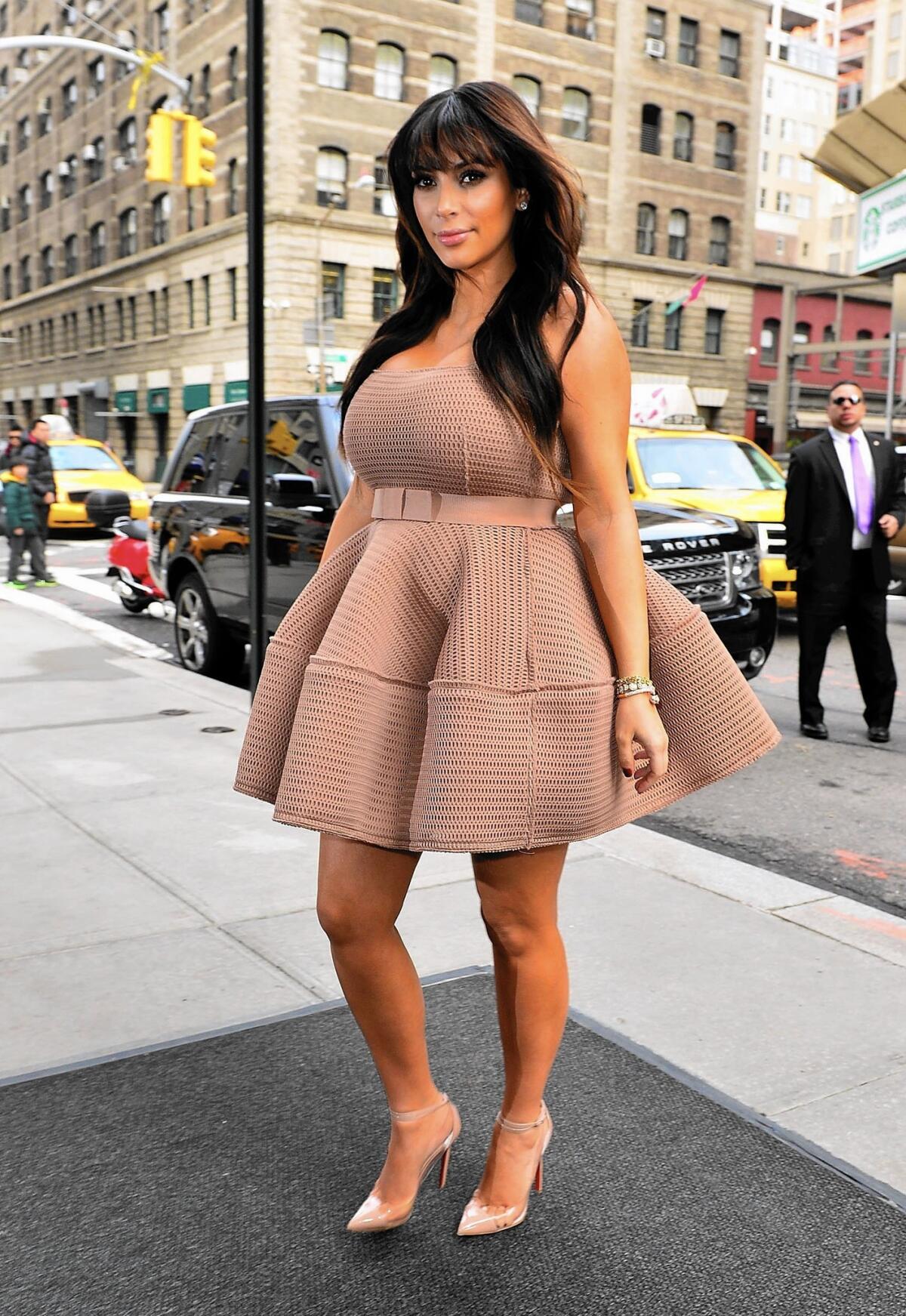Coming to terms with comments on pregnancy weight gain

“You’re showing a lot for three months.”
With that one line, from a well-meaning Macy’s sales clerk, I felt a rush of anxiety about my body.
For some women, particularly those who have suffered through infertility and miscarriages, a swelling baby bump is a badge of honor. I wish I could say I have enough confidence to be part of that pack. But that day in the Macy’s maternity section, surrounded by the racks of belly-hugging knitwear and boyfriend jeans with added elastic waists, all my fears of face bloat and waddling took over. It was all I could do to keep from dropping my intended purchases and obsessively nitpicking every detail of my body in the nearby mirrors.
Since I announced my pregnancy, I’ve been met with comments from two camps: There’s the older generation, like my stereotypically overbearing grandmother who starts phone calls with “Are you fat yet?” Then there are my friends, particularly those in New York and Los Angeles, who immediately recommended that I stop looking in full-length mirrors. These are the same people who ask, with a certain degree of admiration and astonishment, “Did you see how great [insert the name of an ethereal yet pregnant friend] looked?”
What’s a merely mortal woman to do?
WebMD says an average woman should gain 25 to 35 pounds during a pregnancy. The U.S. Department of Health and Human Services’ women’s health website reminds us that “most women need [only] 300 calories a day more during at least the last six months of pregnancy than they do pre-pregnancy.”
But WebMD and HHS are institutions. They’re not going to suffer through pregnancy weight gain.
“I got the occasional ‘Are you sure it’s not twins?’ the first time around,” says Liz Garcia, a film and TV writer-director-producer in Silver Lake who recently gave birth to her second son. “As though I wouldn’t know if I were having twins. Thanks a lot.” And, yes, despite her best efforts, pregnancy did bring to life the body issues she encountered during adolescence and had spent the better part of her adulthood trying to overcome.
Melanie Klein, an associate faculty member at Santa Monica College who teaches sociology and women’s studies, points a finger at Hollywood and the media’s increased fascination with celebrities’ private lives, including “their pregnancies, their babies and their children.”
Sharlene Hesse-Biber, the director of the women’s and gender studies program at Boston College, says that, while tabloid fodder is a factor — she mentions easy targets like love-to-hate celebrities Kim Kardashian and Jessica Simpson — society has “more rules and regulations, in terms of policing a woman’s body, than there have been before.” She calls it “social construction” and says that women are “taking cues from their culture as to what an ideal body type is.”
And even if a woman can limit pregnancy weight gain, there are those “getting back into shape” issues to contemplate after delivery — sometimes there’s a back story behind that “post-baby body.” I met Louisa Kendrick Burton, an actress in the Fairfax district, at a baby shower six weeks after she delivered twins. At the party, she was constantly praised for her svelte frame. Chances are, most of the well-wishers didn’t know about the prolonged morning sickness and eventual bed rest she endured during the pregnancy that had a great deal to do with her slender state. (And if you’re contemplating Jessica Alba’s post-baby body, let me remind you that she wore corsets to return to her pre-baby state.)
Claire Mysko, a body image and eating disorder expert and coauthor of the advice book “Does This Pregnancy Make Me Look Fat?,” says that comments and fixations on women’s bodies are sometimes thought of as bonding moments among women. But “instead of it being a competition of, oh, you think you look fat, or you think you haven’t gotten the weight off, try to talk about what is actually going on … it’s always about deeper issues.”
And here are mine: As a formerly bullied tween and teen, I’ve never been happy with the way I look, and there are days when pregnancy exacerbates that, days when I find myself asking my sartorically challenged husband for guidance on an outfit selection. But there are also days when I look in the mirror, rub my belly and smile because I’ve accepted the form my body has chosen to take and know that it is not a permanent one. Those days, I don’t mind ending the night with a bowl of ice cream (and, no, it does not come topped with pickles).
::
Advice books on women’s weight issues in pregnancy and other times
Women have long been confronted with the pressure of maintaining their figures during pregnancy. But there are some reading materials that can help keep us grounded during our time gestating. Here are some recommendations:
Claire Mysko and Magali Amadeï’s “Does This Pregnancy Make Me Look Fat?: The Essential Guide to Loving Your Body Before and After Baby” interviews more than 400 women — and men — and takes an honest approach to, well, what to expect when you’re expecting.
Sharlene Hesse-Biber’s “The Cult of Thinness” delves into American women’s obsessions with weight, during pregnancy and at other times.
Rebecca Odes and Ceridwen Morris’ “From the Hips: A Comprehensive, Open-Minded, Uncensored, Totally Honest Guide to Pregnancy, Birth, and Becoming a Parent” offers matter-of-fact advice on all things pre- and postnatal — including how to deal with those busybodies who feel it’s their prerogative to ask about (and advise on) your changing body.



